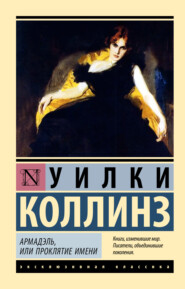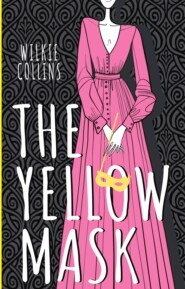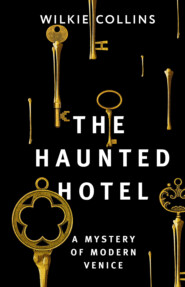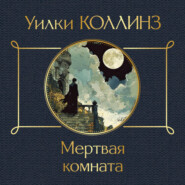По всем вопросам обращайтесь на: info@litportal.ru
(©) 2003-2025.
✖
The Moonstone
Автор
Год написания книги
2019
Настройки чтения
Размер шрифта
Высота строк
Поля
âI can see,â says Mr. Franklin, âthat the Colonelâs object may, quite possibly, have beenânot to benefit his niece, whom he had never even seenâbut to prove to his sister that he had died forgiving her, and to prove it very prettily by means of a present made to her child. There is a totally different explanation from yours, Betteredge, taking its rise in a Subjective â Objective point of view. From all I can see, one interpretation is just as likely to be right as the other.â
Having brought matters to this pleasant and comforting issue, Mr. Franklin appeared to think that he had completed all that was required of him. He laid down flat on his back on the sand, and asked what was to be done next.
He had been so clever, and clear-headed (before he began to talk the foreign gibberish), and had so completely taken the lead in the business up to the present time, that I was quite unprepared for such a sudden change as he now exhibited in this helpless leaning upon me. It was not till later that I learnedâby assistance of Miss Rachel, who was the first to make the discoveryâthat these puzzling shifts and transformations in Mr. Franklin were due to the effect on him of his foreign training. At the age when we are all of us most apt to take our colouring, in the form of a reflection from the colouring of other people, he had been sent abroad, and had been passed on from one nation to another, before there was time for any one colouring more than another to settle itself on him firmly. As a consequence of this he had come back with so many different sides to his character, all more or less jarring with each other, that he seemed to pass his life in a state of perpetual contradiction with himself. He could be a busy man, and a lazy man; cloudy in the head, and clear in the head; a model of determination, and a spectacle of helplessness, all together. He had his French side, and his German side, and his Italian sideâthe original English foundation showing through, every now and then, as much as to say, âHere I am, sorely transmogrified, as you see, but thereâs something of me left at the bottom of him still.â Miss Rachel used to remark that the Italian side of him was uppermost, on those occasions when he unexpectedly gave in, and asked you in his nice sweet-tempered way to take his own responsibilities on your shoulders. You will do him no injustice, I think, if you conclude that the Italian side of him was uppermost now.
âIsnât it your business, sir,â I asked, âto know what to do next? Surely it canât be mine?â
Mr. Franklin didnât appear to see the force of my questionânot being in a position, at the time, to see anything but the sky over his head.
âI donât want to alarm my aunt without reason,â he said. âAnd I donât want to leave her without what may be a needful warning. If you were in my place, Betteredge, tell me, in one word, what would you do?â
In one word, I told him: âWait.â
âWith all my heart,â says Mr. Franklin. âHow long?â
I proceeded to explain myself.
âAs I understand it, sir,â I said, âsomebody is bound to put this plaguy Diamond into Miss Rachelâs hands on her birthdayâand you may as well do it as another. Very good. This is the twenty-fifth of May, and the birthday is on the twenty-first of June. We have got close on four weeks before us. Letâs wait and see what happens in that time; and letâs warn my lady or not, as the circumstances direct us.â
âPerfect, Betteredge, as far as it goes!â says Mr. Franklin. âBut between this and the birthday, whatâs to be done with the Diamond?â
âWhat your father did with it, to be sure, sir!â I answered. âYour father put it in the safe keeping of a bank in London. You put it in the safe keeping of the bank at Frizinghall.â (Frizinghall was our nearest town, and the Bank of England wasnât safer than the bank there). âIf I were you, sir,â I added, âI would ride straight away with it to Frizinghall before the ladies come back.â
The prospect of doing somethingâand, what is more, of doing that something on a horseâbrought Mr. Franklin up like lightning from the flat of his back. He sprang to his feet, and pulled me up, without ceremony, on to mine. âBetteredge, you are worth your weight in gold,â he said. âCome along, and saddle the best horse in the stables directly!â
Here (God bless it!) was the original English foundation of him showing through all the foreign varnish at last! Here was the Master Franklin I remembered, coming out again in the good old way at the prospect of a ride, and reminding me of the good old times! Saddle a horse for him? I would have saddled a dozen horses, if he could only have ridden them all!
We went back to the house in a hurry; we had the fleetest horse in the stables saddled in a hurry; and Mr. Franklin rattled off in a hurry, to lodge the cursed Diamond once more in the strong-room of a bank. When I heard the last of his horseâs hoofs on the drive, and when I turned about in the yard and found I was alone again, I felt half inclined to ask myself if I hadnât woke up from a dream.
7
While I was in this bewildered frame of mind, sorely needing a little quiet time by myself to put me right again, my daughter Penelope got in my way (just as her late mother used to get in my way on the stairs), and instantly summoned me to tell her all that had passed at the conference between Mr. Franklin and me. Under present circumstances, the one thing to be done was to clap the extinguisher upon Penelopeâs curiosity on the spot. I accordingly replied that Mr. Franklin and I had both talked of foreign politics, till we could talk no longer, and had then mutually fallen asleep in the heat of the sun. Try that sort of answer when your wife or your daughter next worries you with an awkward question at an awkward time, and depend on the natural sweetness of women for kissing and making it up again at the next opportunity.
The afternoon wore on, and my lady and Miss Rachel came back.
Needless to say how astonished they were, when they heard that Mr. Franklin Blake had arrived, and had gone off again on horseback. Needless also to say, that they asked awkward questions directly, and that the âforeign politicsâ and the âfalling asleep in the sunâ wouldnât serve a second time over with them. Being at the end of my invention, I said Mr. Franklinâs arrival by the early train was entirely attributable to one of Mr. Franklinâs freaks. Being asked, upon that, whether his galloping off again on horseback was another of Mr. Franklinâs freaks, I said, âYes, it wasâ; and slipped out of itâI think very cleverlyâin that way.
Having got over my difficulties with the ladies, I found more difficulties waiting for me when I went back to my own room. In came Penelopeâwith the natural sweetness of womenâto kiss and make it up again; andâwith the natural curiosity of womenâto ask another question. This time she only wanted me to tell her what was the matter with our second housemaid, Rosanna Spearman.
After leaving Mr. Franklin and me at the Shivering Sand, Rosanna, it appeared, had returned to the house in a very unaccountable state of mind. She had turned (if Penelope was to be believed) all the colours of the rainbow. She had been merry without reason, and sad without reason. In one breath she asked hundreds of questions about Mr. Franklin Blake, and in another breath she had been angry with Penelope for presuming to suppose that a strange gentleman could possess any interest for her. She had been surprised, smiling, and scribbling Mr. Franklinâs name inside her workbox. She had been surprised again, crying and looking at her deformed shoulder in the glass. Had she and Mr. Franklin known anything of each other before to-day? Quite impossible! Had they heard anything of each other! Impossible again! I could speak to Mr. Franklinâs astonishment as genuine, when he saw how the girl stared at him. Penelope could speak to the girlâs inquisitiveness as genuine, when she asked questions about Mr. Franklin. The conference between us, conducted in this way, was tiresome enough, until my daughter suddenly ended it by bursting out with what I thought the most monstrous supposition I had ever heard in my life.
âFather!â says Penelope, quite seriously, âthereâs only one explanation of it. Rosanna has fallen in love with Mr. Franklin Blake at first sight!â
You have heard of beautiful young ladies falling in love at first sight, and have thought it natural enough. But a housemaid out of a reformatory, with a plain face and a deformed shoulder, falling in love, at first sight, with a gentleman who comes on a visit to her mistressâs house, match me that, in the way of an absurdity, out of any story-book in Christendom, if you can! I laughed till the tears rolled down my cheeks. Penelope resented my merriment, in rather a strange way. âI never knew you cruel before, father,â she said, very gently, and went out.
My girlâs words fell upon me like a splash of cold water. I was savage with myself, for feeling uneasy in myself the moment she had spoken themâbut so it was. We will change the subject, if you please. I am sorry I drifted into writing about it; and not without reason, as you will see when we have gone on together a little longer.
The evening came, and the dressing-bell for dinner rang, before Mr. Franklin returned from Frizinghall. I took his hot water up to his room myself, expecting to hear, after this extraordinary delay, that something had happened. To my great disappointment (and no doubt to yours also), nothing had happened. He had not met with the Indians, either going or returning. He had deposited the Moonstone in the bankâdescribing it merely as a valuable of great priceâand had got the receipt for it safe in his pocket. I went downstairs, feeling that this was rather a flat ending, after all our excitement about the Diamond earlier in the day.
How the meeting between Mr. Franklin and his aunt and cousin went off, is more than I can tell you.
I would have given something to have waited at table that day. But, in my position in the household, waiting at dinner (except on high family festivals) was letting down my dignity in the eyes of the other servantsâa thing which my lady considered me quite prone enough to do already, without seeking occasions for it. The news brought to me from the upper regions, that evening, came from Penelope and the footman. Penelope mentioned that she had never known Miss Rachel so particular about the dressing of her hair, and had never seen her look so bright and pretty as she did when she went down to meet Mr. Franklin in the drawing-room. The footmanâs report was, that the preservation of a respectful composure in the presence of his betters, and the waiting on Mr. Franklin Blake at dinner, were two of the hardest things to reconcile with each other that had ever tried his training in service. Later in the evening, we heard them singing and playing duets, Mr. Franklin piping high, Miss Rachel piping higher, and my lady, on the piano, following them as it were over hedge and ditch, and seeing them safe through it in a manner most wonderful and pleasant to hear through the open windows, on the terrace at night. Later still, I went to Mr. Franklin in the smoking-room, with the soda-water and brandy, and found that Miss Rachel had put the Diamond clean out of his head. âSheâs the most charming girl I have seen since I came back to England!â was all I could extract from him, when I endeavoured to lead the conversation to more serious things.
Towards midnight, I went round the house to lock up, accompanied by my second in command (Samuel, the footman), as usual. When all the doors were made fast, except the side door that opened on the terrace, I sent Samuel to bed, and stepped out for a breath of fresh air before I too went to bed in my turn.
The night was still and close, and the moon was at the full in the heavens. It was so silent out of doors, that I heard from time to time, very faint and low, the fall of the sea, as the ground-swell heaved it in on the sand-bank near the mouth of our little bay. As the house stood, the terrace side was the dark side; but the broad moonlight showed fair on the gravel walk that ran along the next side to the terrace. Looking this way, after looking up at the sky, I saw the shadow of a person in the moonlight thrown forward from behind the corner of the house.
Being old and sly, I forbore to call out; but being also, unfortunately, old and heavy, my feet betrayed me on the gravel. Before I could steal suddenly round the corner, as I had proposed, I heard lighter feet than mineâand more than one pair of them as I thoughtâretreating in a hurry. By the time I had got to the corner, the trespassers, whoever they were, had run into the shrubbery at the off side of the walk, and were hidden from sight among the thick trees and bushes in that part of the grounds. From the shrubbery, they could easily make their way, over our fence into the road. If I had been forty years younger I might have had a chance of catching them before they got clear of our premises. As it was, I went back to set a-going a younger pair of legs than mine. Without disturbing anybody, Samuel and I got a couple of guns, and went all round the house and through the shrubbery. Having made sure that no persons were lurking about anywhere in our grounds, we turned back. Passing over the walk where I had seen the shadow, I now noticed, for the first time, a little bright object, lying on the clean gravel, under the light of the moon. Picking the object up, I discovered it was a small bottle, containing a thick sweet-smelling liquor, as black as ink.
I said nothing to Samuel. But, remembering what Penelope had told me about the jugglers, and the pouring of the little pool of ink into the palm of the boyâs hand, I instantly suspected that I had disturbed the three Indians lurking about the house, and bent, in their heathenish way, on discovering the whereabouts of the Diamond that night.
8
Here, for one moment, I find it necessary to call a halt.
On summoning up my own recollectionsâand on getting Penelope to help me, by consulting her journalâI find that we may pass pretty rapidly over the interval between Mr. Franklin Blakeâs arrival and Miss Rachelâs birthday. For the greater part of that time the days passed, and brought nothing with them worth recording. With your good leave, then, and with Penelopeâs help, I shall notice certain dates only in this place; reserving to myself to tell the story day by day, once more, as soon as we get to the time when the business of the Moonstone became the chief business of everybody in our house.
This said, we may now go on againâbeginning, of course, with the bottle of sweet-smelling ink which I found on the gravel walk at night.
On the next morning (the morning of the twenty-sixth) I showed Mr. Franklin this article of jugglery, and told him what I have already told you. His opinion was, not only that the Indians had been lurking about after the Diamond, but also that they were actually foolish enough to believe in their own magicâmeaning thereby the making of signs on a boyâs head, and the pouring of ink into a boyâs hand, and then expecting him to see persons and things beyond the reach of human vision. In our country, as well as in the East, Mr. Franklin informed me, there are people who practise this curious hocus-pocus (without the ink, however); and who call it by a French name, signifying something like brightness of sight. âDepend upon it,â says Mr. Franklin, âthe Indians took it for granted that we should keep the Diamond here; and they brought their clairvoyant boy to show them the way to it, if they succeeded in getting into the house last night.â
âDo you think theyâll try again, sir?â I asked.
âIt depends,â says Mr. Franklin, âon what the boy can really do. If he can see the Diamond through the iron safe of the bank at Frizinghall, we shall be troubled with no more visits from the Indians for the present. If he canât, we shall have another chance of catching them in the shrubbery, before many more nights are over our heads.â
I waited pretty confidently for that latter chance; but, strange to relate, it never came.
Whether the jugglers heard, in the town, of Mr. Franklin having been seen at the bank, and drew their conclusions accordingly; or whether the boy really did see the Diamond where the Diamond was now lodged (which I, for one, flatly disbelieve); or whether, after all, it was a mere effect of chance, this at any rate is the plain truthânot the ghost of an Indian came near the house again, through the weeks that passed before Miss Rachelâs birthday. The jugglers remained in and about the town plying their trade; and Mr. Franklin and I remained waiting to see what might happen, and resolute not to put the rogues on their guard by showing our suspicions of them too soon. With this report of the proceedings on either side, ends all that I have to say about the Indians for the present.
On the twenty-ninth of the month, Miss Rachel and Mr. Franklin hit on a new method of working their way together through the time which might otherwise have hung heavy on their hands. There are reasons for taking particular notice here of the occupation that amused them. You will find it has a bearing on something that has still to come.
Gentlefolks in general have a very awkward rock ahead in lifeâthe rock ahead of their own idleness. Their lives being, for the most part, passed in looking about them for something to do, it is curious to seeâespecially when their tastes are of what is called the intellectual sortâhow often they drift blindfold into some nasty pursuit. Nine times out of ten they take to torturing something, or to spoiling somethingâand they firmly believe they are improving their minds, when the plain truth is, they are only making a mess in the house. I have seen them (ladies, I am sorry to say, as well as gentlemen) go out, day after day, for example, with empty pill-boxes, and catch newts, and beetles, and spiders, and frogs, and come home and stick pins through the miserable wretches, or cut them up, without a pang of remorse, into little pieces. You see my young master, or my young mistress, poring over one of their spidersâ insides with a magnifying glass; or you meet one of their frogs walking downstairs without his headâand when you wonder what this cruel nastiness means, you are told that it means a taste in my young master or my young mistress for natural history. Sometimes, again, you see them occupied for hours together in spoiling a pretty flower with pointed instruments, out of a stupid curiosity to know what the flower is made of. Is its colour any prettier, or its scent any sweeter, when you do know? But there! the poor souls must get through the time, you seeâthey must get through the time. You dabbled in nasty mud, and made pies, when you were a child; and you dabble in nasty science, and dissect spiders, and spoil flowers, when you grow up. In the one case and in the other, the secret of it is, that you have got nothing to think of in your poor empty head, and nothing to do with your poor idle hands. And so it ends in your spoiling canvas with paints, and making a smell in the house; or in keeping tadpoles in a glass box full of dirty water, and turning everybodyâs stomach in the house; or in chipping off bits of stone here, there, and everywhere, and dropping grit into all the victuals in the house; or in staining your fingers in the pursuit of photography, and doing justice without mercy on everybodyâs face in the house. It often falls heavy enough, no doubt, on people who are really obliged to get their living, to be forced to work for the clothes that cover them, the roof that shelters them, and the food that keeps them going. But compare the hardest dayâs work you ever did with the idleness that splits flowers and pokes its way into spiderâs stomach, and thank your stars that your head has got something it must think of, and your hands something that they must do.
As for Mr. Franklin and Miss Rachel, they tortured nothing, I am glad to say. They simply confined themselves to making a mess; and all they spoilt, to do them justice, was the panelling of a door.
Mr. Franklinâs universal genius, dabbling in everything, dabbled in what he called âdecorative painting.â He had invented, he informed us, a new mixture to moisten paint with, which he described as a âvehicleâ. What it was made of, I donât know. What it did, I can tell you in two wordsâit stank. Miss Rachel being wild to try her hand at the new process, Mr. Franklin sent to London for the materials; mixed them up, with accompaniment of a smell which made the very dogs sneeze when they came into the room; put an apron and a bib over Miss Rachelâs gown, and set her to work decorating her own little sitting-roomâcalled, for want of English to name it in, her âboudoir.â They began with the inside of the door. Mr. Franklin scraped off all the nice varnish with pumice-stone, and made what he described as a surface to work on. Miss Rachel then covered the surface, under his directions and with his help, with patterns and devicesâgriffins, birds, flowers, cupids, and such likeâcopied from designs made by a famous Italian painter, whose name escapes me: the one, I mean, who stocked the world with Virgin Maries and had a sweetheart at the bakerâs. Viewed as work, this decoration was slow to do, and dirty to deal with. But our young lady and gentleman never seemed to tire of it. When they were not riding, or seeing company, or taking their meals, or piping their songs, there they were with their heads together, as busy as bees, spoiling the door. Who was the poet who said Satan finds some mischief still for idle hands to do? If he had occupied my place in the family, and had seen Miss Rachel with her brush, and Mr. Franklin with his vehicle, he could have written nothing truer of either of them than that.
The next date worthy of notice is Sunday the fourth of June.
On that evening, we in the servantsâ hall, debated a domestic question for the first time, which, like the decoration of the door, has its bearings on something that is still to come.
Seeing the pleasure which Mr. Franklin and Miss Rachel took in each otherâs society, and noting what a pretty match they were in all personal respects, we naturally speculated on the chance of their putting their heads together with other objects in view besides the ornamenting of a door. Some of us said there would be a wedding in the house before the summer was over. Others (led by me) admitted it was likely enough Miss Rachel might be married; but we doubted (for reasons which will presently appear) whether her bridegroom would be Mr. Franklin Blake.
That Mr. Franklin Blake was in love, on his side, nobody who saw and heard him could doubt. The difficulty was to fathom Miss Rachel. Let me do myself the honour of making you acquainted with her; after which, I will leave you to fathom for yourselfâif you can.
My young ladyâs eighteenth birthday was the birthday now coming, on the twenty-first of June. If you happen to like dark women (who, I am informed, have gone out of fashion latterly in the gay world), and if you have no particular prejudice in favour of size, I answer for Miss Rachel as one of the prettiest girls your eyes ever looked on. She was small and slim, but all in fine proportion from top to toe. To see her sit down, to see her get up, and especially to see her walk, was enough to satisfy any man in his senses that the graces of her figure (if you will pardon me the expression) were in her flesh and not in her clothes. Her hair was the blackest I ever saw. Her eyes matched her hair. Her nose was not quite large enough, I admit. Her mouth and chin were (to quote Mr. Franklin) morsels for the gods; and her complexion (on the same undeniable authority) was as warm as the sun itself, with this great advantage over the sun, that it was always in nice order to look at. Add to the foregoing that she carried her head as upright as a dart, in a dashing, spirited, thoroughbred wayâthat she had a clear voice, with a ring of the right metal in it, and a smile that began very prettily in her eyes before it got to her lipsâand there behold the portrait of her, to the best of my painting, as large as life!
And what about her disposition next? Had this charming creature no faults? She had just as many faults as you have, maâamâneither more nor less.

















